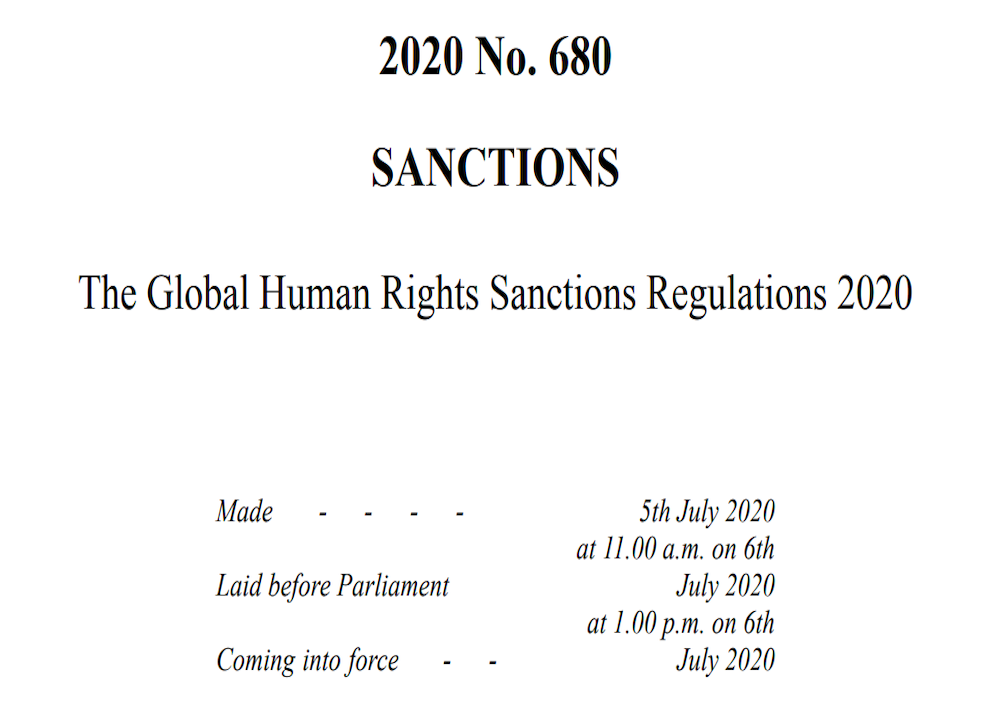Hummam Quader Chowdhury and Mir Ahmed Bin Quasem. Credit: Facebook

On July 5th, the UK government published the Global Human Rights Sanctions Regulations 2020 which allows it to both prohibit entry into the UK and freeze the assets of those they consider responsible for serious violations of human rights. Bangladesh ministers as well as other government and law enforcement officials – particularly those who come to the UK or/and have financial assets there – should be anxious about its possible impact on them.
The purposes of the regulations are to “deter, and provide accountability for” involvement in “activities” in another country that amounts to a “serious violation” of an individual’s “right to life” or “right not to be subject to torture or cruel, inhuman or degrading treatment or punishment. ”*
In the context of Bangladesh this would include extra judicial killings, enforced disappearances and torture – all of which are widespread, and often known about and authorised at a senior government and law enforcement level.
The new regulations allow the UK Foreign Minister to “designate” a person when there are “reasonable grounds to suspect that that person” is “involved” in one of these activities which means that the person:
– “is responsible for or engages in such an activity”, or
– “facilitates, incites, promotes, or provides support for such an activity” or
– “conceals evidence of such an activity” or
– “makes available funds” which may contribute to that activity or
– “profit financially or obtains other obtains any other benefit” from that activity or
– “is responsible for the investigation or prosecution of such an activity and intentionally or recklessly fails to fulfil that responsibility”
It also includes a person who is “acting on behalf of or at the direction of a person” who is or has been involved in the activity.
It is clear that a wide group of people could be designated including Bangladesh ministers who sanction an enforced disappearance or extra-judicial killing and the law enforcement officials who run or work within the Bangladesh police, Rapid Action Battalion and the country’s military intelligence agency, the Director General of Forces Intelligence.
Since 2009, when the Awami League came to power, over 500 people have been subject to enforced disappearances for various periods of time. The whereabouts of many of them remain unknown. There have also been hundreds of alleged extra-judicial killings. Most of these have not been subject to any proper investigation – but some have .
While some disappearances take place without official governmental authorisation, many are. In at least two disappearances – the pick-up and secret detentions of Mir Ahmed Bin Quasem and Hummam Quader Chowdhury in August 2016 – there is evidence from a close associate of the prime minister, that Sheikh Hasina herself authorized their secret detention at the suggestion of the military intelligence agency DGFI. Chowdhury was released after seven months in April 2017 but Quasem is either still secretly detained or has been killed.
One particular government official who has a relationship with the UK is Tarique Ahmed Siddique, a retired major general. Siddique is the prime minister’s security adviser with significant control over the country’s armed forces and intelligence agencies. Recently, there have been detailed allegations against Siddique of his key role in a vendetta against a retired UK based military officer turned businessman with whom Siddique had been in business. Three of the UK businessman’s Bangladeshi staff have been secretly detained on two occasions — the longest period for eight months — and one of them has died in state custody. Three of the businessman’s brothers in Bangladesh have also been secretly detained, and one continues to be so.
Siddique is the uncle of Tulip Siddiq, the UK labor member of parliament and he also has two daughters living in the UK. Siddique travels a lot backwards and forwards between Bangladesh and the UK. Certainly a potential target of such sanctions?
Even if the regulations do apply widely, can one really expect the UK government to really start using them in relation to Bangladesh? The first people who the Minister designated included individuals from Saudi Arabia, Russia, and Myanmar, and entities in North Korea. However, as Human Rights Watch (HRW) has noted “The absence of any Chinese officials linked to abuses in Hong Kong or Xinjiang is a shocking omission.” However, to be optimistic, these sanctions could be for the future.
HRW also noted the lack of consistency in UK actions: “It was deeply disappointing that 24 hours after sanctioning Saudi officials for human rights abuses, the UK government lifted its ban on arms exports to Saudi Arabia, despite clear evidence of the Saudi-led coalition’s. responsibility for war crimes in Yemen. “
In the past, the UK has said and done little about Bangladesh human rights. Nonetheless, the sanctioning regime now provides the government a clear mechanism that they did not have in the past to take action against individuals human rights violators in the future. (One should note that the sanctions also apply to non-state actors and so the opposition Bangladesh Nationalist Party could be targeted if they were to repeat the violent protests, some of which was aimed at civilians, in 2015.)
Therefore, this is the right time for Bangladesh human rights activists and journalists to start collecting detailed information on the criminal involvement of individual government ministers, officials and law enforcement officials and in secret detentions, extra judicial killings and torture.
* Note: It could also include activities by a non-UK citizen that take place within the UK, and, apart from right to life and torture, serious violations can also include those relating to the “right to be free from slavery, not to be held in servitude or required to perform forced or compulsory labor.”
//David Bergman

